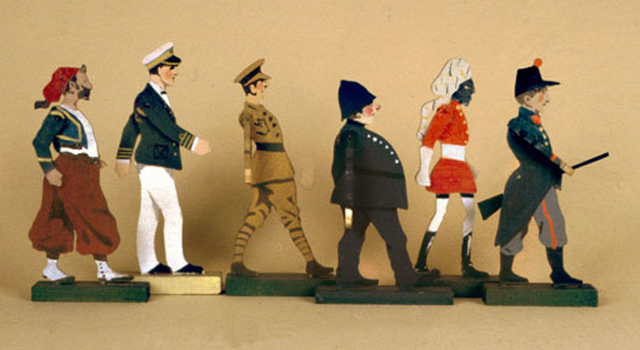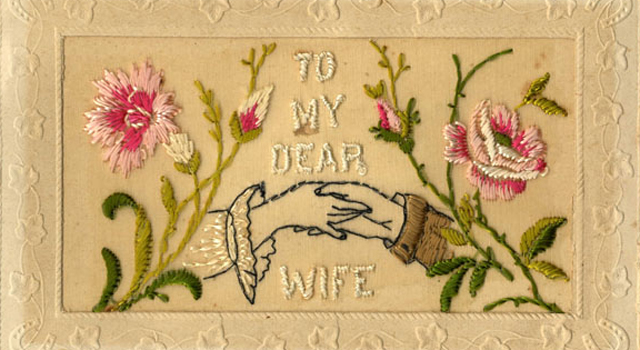Articles
No Comments
By Voices
On 01, Mar 2014 | No Comments | In Cities Resources | By Voices
Wolverhampton Art Gallery
Wolverhampton Art Gallery holds a range of objects that relate to the First World War, from embroidered postcards that kept a connection between the Home Front and the trenches, to paintings and drawings that reflect upon it both immediately and many years after its end.
The collection includes domestic objects that reflect how home life was effected, with toy soldiers and dolls, and more public objects that show the immediate importance of remembrance through medals and memorials. Here are just a few highlights from the collection.
!['Old Bill' Rag Doll 'Old Bill' Rag Doll [WAVE: D170]](http://www.voicesofwarandpeace.org/wp-content/uploads/2014/03/d170.jpg) The rag doll dressed as a FWW soldier is based on the character created by Bruce Bairnsfather. Old Bill was a comic figure which gained great popularity during the first world war. Bairnsfather’s direct experience of the trenches allowed him to irreverently portray the character of Old Bill, which grew in popularity with the troops and was considered to have a morale boosting effect. When Bairnsfather’s health deteriorated to the point where active service was no longer viable, he was appointed “Officer Cartoonist”, the first ever person appointed to this post. Throughout the rest of the First World War he was loaned to the French, Italians and Americans to produce cartoons to boost morale for the troops.
The rag doll dressed as a FWW soldier is based on the character created by Bruce Bairnsfather. Old Bill was a comic figure which gained great popularity during the first world war. Bairnsfather’s direct experience of the trenches allowed him to irreverently portray the character of Old Bill, which grew in popularity with the troops and was considered to have a morale boosting effect. When Bairnsfather’s health deteriorated to the point where active service was no longer viable, he was appointed “Officer Cartoonist”, the first ever person appointed to this post. Throughout the rest of the First World War he was loaned to the French, Italians and Americans to produce cartoons to boost morale for the troops.
![Drawing of Bronze War Memorial, by George Walker Drawing of Bronze War Memorial, by George Walker [WAVE: W230]](http://www.voicesofwarandpeace.org/wp-content/uploads/2014/03/W230_P1.jpg) The Gallery holds the original Drawing for the Bronze Memorial at Heath Town by George Walker (1861-1939). Walker was a sculptor and the creator of several WW1 war memorials, including those in Chesham, Dartford, Derby, and Ironbridge. This particular memorial is believed to be the earliest dedicated to the First World War in Wolverhampton, having been erected in 1920. The figure stands on a granite base, depicting naval and RAF scenes, in the centre of Heath Town Park.
The Gallery holds the original Drawing for the Bronze Memorial at Heath Town by George Walker (1861-1939). Walker was a sculptor and the creator of several WW1 war memorials, including those in Chesham, Dartford, Derby, and Ironbridge. This particular memorial is believed to be the earliest dedicated to the First World War in Wolverhampton, having been erected in 1920. The figure stands on a granite base, depicting naval and RAF scenes, in the centre of Heath Town Park.
![Embroidered WW1 Silk [WAVE: M1022]](http://www.voicesofwarandpeace.org/wp-content/uploads/2014/03/m1022_p1.jpg) Embroidered postcards from the First World War are generally known as “WW1 Silks”. They were mostly produced by French and Belgian women refugees who worked in their homes and refugee camps, and then sent the finished strips to factories for cutting and mounting on postcards. Because of their beauty and uniqueness, the WW1 Silks were popular with British and American servicemen on duty in France.
Embroidered postcards from the First World War are generally known as “WW1 Silks”. They were mostly produced by French and Belgian women refugees who worked in their homes and refugee camps, and then sent the finished strips to factories for cutting and mounting on postcards. Because of their beauty and uniqueness, the WW1 Silks were popular with British and American servicemen on duty in France.
![WW1 Wooden Toy Figures [WAVE: D177]](http://www.voicesofwarandpeace.org/wp-content/uploads/2014/03/d177.jpg) The set of wooden figures make up the various allied forces that fought with Britain during the First World War. These figures would have been played with by children, as part of role-playing games about war which were popular at the time.
The set of wooden figures make up the various allied forces that fought with Britain during the First World War. These figures would have been played with by children, as part of role-playing games about war which were popular at the time.
![World War One Medal [WAVE: M479]](http://www.voicesofwarandpeace.org/wp-content/uploads/2014/03/m479_1_p1.jpg) This is one of several war medals in the collection. This particular medal was awarded to Private A. A. Owen for service in the First World War ‘The Great War for Civilisation 1914-1919’.
This is one of several war medals in the collection. This particular medal was awarded to Private A. A. Owen for service in the First World War ‘The Great War for Civilisation 1914-1919’.
For more images from WAVE see their Flickr pages.





Submit a Comment